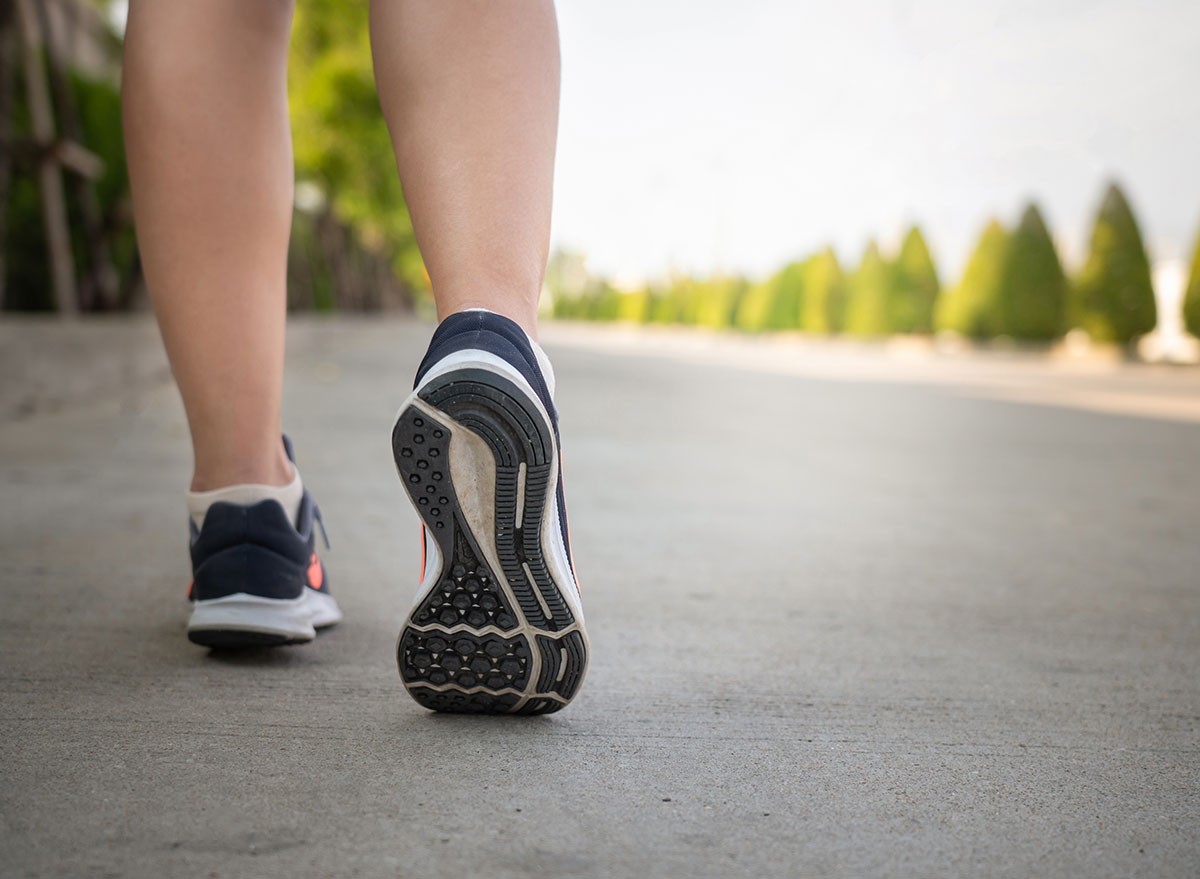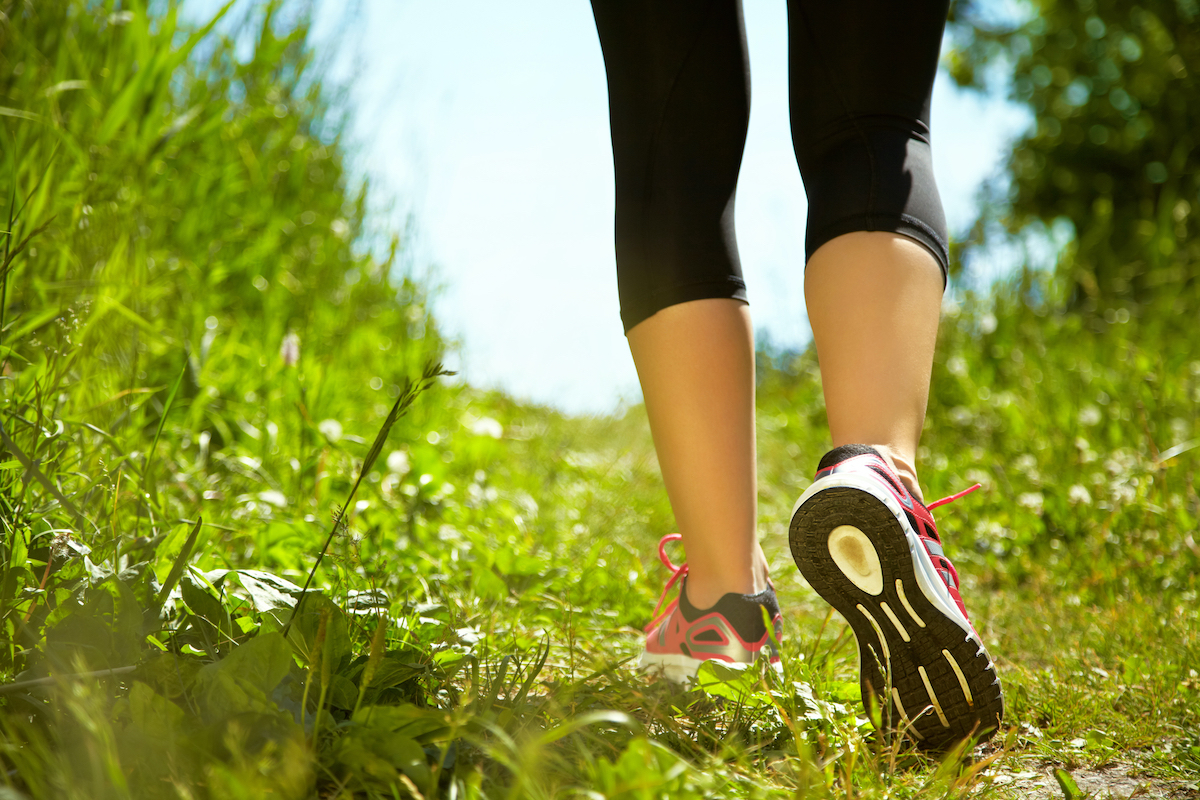Want to Sleep Better? Walk For This Many Minutes Every Day, Says Expert

Though scientists still remain unclear on why it's the case, we can conclusively say that exercising your body every day is crucial to better and longer sleep. "We have solid evidence that exercise does, in fact, help you fall asleep more quickly and improves sleep quality," Charlene Gamaldo, M.D. , medical director of Johns Hopkins Center for Sleep at Howard County General Hospital, explained to Johns Hopkins. Studies have long connected exercise with enhanced slow-wave deep sleep, and moving more every day is indirectly involved with things such as mood and relaxation, which both affect your sleep quality.
Now, exercising alone isn't the only thing that will affect your Zs, of course. Alcohol and caffeine harm your sleep quality, along with anxiety and depression. If you're a habitual meditator who practices upwards of 30 minutes a day, five days a week, new research indicates that you may actually be experiencing poorer sleep. And if you eat your dinner way too late, you could be priming your body for a terrible night of tossing and turning.
But if you're looking to enhance your sleep quality, experts say that there's a certain amount of exercise you should aspire to hit each day. And if you walk for exercise, you won't only improve your brain, your heart, your muscles, and your overall sense of wellbeing, but you'll also sleep better—assuming you're walking the right way and you're on the feet for the right amount of time. Curious to know more? Read on, because here's how long you need to walk every day to sleep better, according to one top trainer and mind-body expert. And for great exercise advice you can use immediately, don't miss The #1 Warning Sign You're Not Exercising Enough, Say Experts.
Brisk Walk for At Least 20 to 25 Minutes

"A brisk walk, bike ride, or a few rounds of bodyweight exercises can do the trick [enhancing your sleep], as long as you're doing it for at least 20 to 25 minutes a day," Dana Santas, C.S.C.S., E-RYT, a top trainer, professional sports mind-body coach, and health contributor for CNN, recently told the network.
She explains that for "most people," it's important that you get enough moderate-level fitness into your day that will make you "naturally crave rest at the end of the day." She emphasizes that you don't need to go all-out at the gym to achieve this.
Still, even if you're exercising, it's important that you don't exercise too late. "We want to avoid training later in the evening because it stimulates the stress hormone cortisol and can cause you to stay awake later," says Tim Liu, C.S.C.S., ETNT Mind+Body's resident trainer and mobility expert. And for more great walking advice, see here for the Secret Side Effects of Walking Before Breakfast, Says Science.
However, It Helps to Lift Weights, As Well

"Adding in some strength training is also important—not just for better sleep but for overall health, because the more muscle mass you have, the more metabolic demand on your body—not just when you're exercising," Santas told CNN. "This means you are burning more calories all day long, essentially revving your engine more consistently all day so that your body is better prepared to rest at night." For more on this, read about the 5-Minute Exercises That Will Make You Sleep Like a Teenager.
If You Still Can't Sleep, Count Your Breaths

If you're finding that brisk walking at least 20 to 25 minutes every day still isn't ensuring restful sleep, you Santas has a few handy tricks you should try. Yes, you should power down your electronics and ensure that you're sleeping in a cool, dark room, but you can also perform some targeted breathing exercises.
"As a breathing and mobility coach, I understand how to leverage my breathing and movement to prompt my body's parasympathetic 'rest and recover' system," she explained. "It's science but it's not rocket science, so anyone can and should do what I do. I use the same simple, yoga-based stretches combined with deep breathing that I program for my athlete clients—just a few moves to release muscular areas where we tend to hold tension that can lead to aches and cramps that might wake us."
She goes on: "We know that just 90 seconds of deep breathing can elicit a relaxation response. Ensuring I take at least a couple of minutes of long, deep, focused breaths is one of the easiest ways to help me fall asleep faster. That's why I always tell people: Don't count sheep; count breaths instead."
Here Are Further Benefits to Walking 20 to 25 Minutes Per Day

If you start brisk walking at least 20 minutes per day, you'll experience positive side effects that affect your life far outside the bedroom. As we've reported, you'll get a surge of energy levels, you're burn calories, you'll likely live longer, and you'll be a far more creative person. For more on this, read up on What Walking for Just 20 Minutes Does to Your Body, Says Science.








